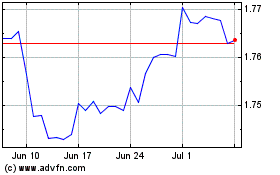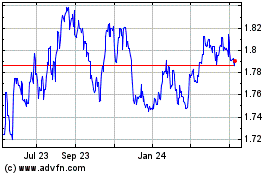Commodity Currencies Slide Amid Rising Risk Aversion
February 10 2016 - 8:07PM
RTTF2
Commodity currencies such as the Australian, the New Zealand and
the Canadian dollars weakened against their major counterparts in
the Asian session on Thursday amid rising risk aversion as U.S.
Federal Reserve Chair Janet Yellen's dovish comments failed to
bolster investor sentiment and amid volatility in crude oil
prices.
In her semi-annual monetary policy report prepared for delivery
to the House Financial Services, Yellen admitted that "downside
risks" from exposure to the slowing Chinese economy could hurt the
U.S.
Although Fed projections call for three or four rate hikes this
year, Yellen said that monetary policy is not on a preset course
and reiterated the oft-repeated statement that the path of the
federal funds rate will depend on incoming data.
Crude oil prices fell due to over supply and a slowdown in
Chinese economy. Crude oil for March delivery are currently down
$0.47 at $26.98 a barrel.
In other economic news, data from the Business New Zealand
showed that the Business NZ Performance of Manufacturing Index, or
PMI, rose to 57.9 in January from 57.0 in December. This was the
highest level of growth since October 2014. Moreover, the sector
has now been in continued expansion since October 2012. Wednesday,
the Australian and the New Zealand dollars showed mixed performance
against their major rivals. While the aussie and the kiwi rose
against the U.S. dollar and the euro, they held steady against the
yen.
Meanwhile, the Canadian dollar fell against its major rivals, as
worries about global economic growth and fall in commodity prices
weighed on investor sentiment. The Canadian dollar fell 0.27
percent against the U.S. dollar, 1.97 against the yen and 0.53
against the euro.
In the Asian trading, the Australian dollar fell to more than a
3-week low of 79.80 against the yen, from yesterday's closing value
of 80.38. The aussie is likely to find support around the 78.00
area.
The aussie edged down to 1.5941 against the euro, from
yesterday's closing value of 1.5899. On the downside, 1.62 is seen
as the next support level for the aussie.
Against the U.S. and the Canadian dollars, the aussie dropped to
0.7084 and 0.9873 from an early 6-day high of 0.7153 and a 9-day
high of 0.9930, respectively. If the aussie extends its downtrend,
it is likely to find support around 0.69 against the greenback and
0.97 against the loonie.
The NZ dollar fell to a 3-week low of 75.08 against the yen,
from yesterday's closing value of 75.73. The kiwi may test support
near the 73.00 region.
The kiwi dropped to 1.6936 against the euro, from yesterday's
closing value of 1.6876. On the downside, 1.72 is seen as the next
support level for the kiwi.
Against the U.S. and the Australian dollars, the kiwi edged down
to 0.6664 and 1.0646 from an early 6-day high of 0.6734 and a 2-day
high of 1.0599, respectively. If the kiwi extends its downtrend, it
is likely to find support around 0.65 against the greenback and
1.07 against the aussie.
The Canadian dollar fell to 3-week lows of 1.5752 against the
euro and 80.72 against the yen, from yesterday's closing quotes of
1.5718 and 81.35, respectively. If the loonie extends its
downtrend, it is likely to find support around 1.61 against the
euro, 78.00 against the yen
Against the U.S. dollar, the loonie dropped to 1.3948 from
yesterday's closing value of 1.3922. The loonie is likely to find
support around the 1.43 area.
Meanwhile, the safe-haven yen rose against its major rivals amid
rising risk aversion.
The yen rose to more than a 2-year high of 163.59 against the
pound and a 16-month high of 112.53 against the U.S. dollar, from
yesterday's closing quotes of 164.56 and 113.32, respectively. If
the yen extends its uptrend, it is likely to find resistance around
162.00 against the pound and 111.00 against the greenback.
Against the euro and the Swiss franc, the yen advanced to 3-week
highs of 127.13 and 115.82 from yesterday's closing quotes of
127.96 and 116.39, respectively. The yen is likely to find
resistance around 126.00 against the euro and 114.00 against the
franc.
Looking ahead, Swiss CPI data for January is due to be released
at 3:15 am ET.
At 6:30 am ET, Bank of England deputy governors Jon Cunliffe and
Andrew Bailey will appear at the Lords committee on euro zone
financial system in London.
In the New York session, U.S. weekly jobless claims for the week
ended February 6 and Canada new housing price index for December
are due to be released.
At 10:00 am ET, Federal Reserve Chair Janet Yellen will testify
on the Semiannual Monetary Policy Report before the Senate Banking
Committee in Washington DC.
Eurozone finance ministers will meet in Brussels later in the
day.
The Chinese market continues to remain closed in observance of
the week-long Golden Week holidays and the Japanese banks are
closed in observance of the National Foundation Day holiday.
Euro vs NZD (FX:EURNZD)
Forex Chart
From Mar 2024 to Apr 2024

Euro vs NZD (FX:EURNZD)
Forex Chart
From Apr 2023 to Apr 2024
